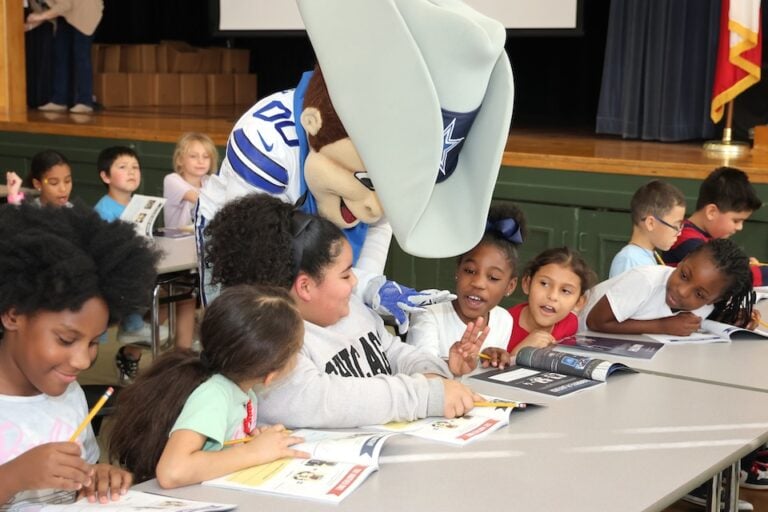Student Code of Conduct
- General Information
- Responsibilities
- Frequently Asked Questions
- Levels of Student Misbehaviors and Corrective Actions
- Assignments and Appeal Processes for DAEP Placements and Expulsions
- Student Dress Code
- Technology Regulation
- Volunteer Guidelines
- Assistance for Students with Learning Differences
- Extracurricular Activities
- Arlington ISD Departmental Supports
- Drug and Alcohol Counseling Options
- Attendance
- Threat Assessments
- School Safety Transfers
- Notices
- Definitions
A Letter from the Superintendent
Arlington ISD students and families,
Welcome to the 2025-2026 school year! We are excited to have you as part of the Arlington ISD family and we know this will be your best year yet! Unlike many districts, we view our Student Code of Conduct as a positive tool that helps us create the learning environments that we desire for each and every student. Whether you are a student, parent, or educator, we know that we all want the same thing - a great experience in school!
Part of our philosophy regarding student behavior in Arlington ISD revolves around a thoughtful, proactive approach to learning. Students throughout our district engage in positive experiences that teach the appropriate behaviors, supports, and expectations for the school. These learning experiences help us ensure that every student knows and understands how they, as individuals, can contribute to the positive campus culture that we all desire.
At the same time, we also believe that students should adhere to clear, consistent expectations for behavior in the school setting. When student behaviors don’t align with our expectations, we believe that appropriate consequences can help teach students more productive behaviors for the future. Teaching our students to become accountable for their actions is a life-skill that will benefit for years to come.
Our Arlington ISD Student Code of Conduct provides clear guidance for our students, and families, for a productive year of learning and growth. The document outlines student responsibilities including attending school on time every day, showing respect for others and their property, expressing thoughts and ideas with civility and respect, and cooperating with campus and district staff. The Student Code of Conduct also outlines appropriate responses, and consequences, when student behaviors fail to meet campus expectations for a safe and productive learning environment.
Please take the time with your family to review our Arlington ISD Student Code of Conduct and become familiar with its content. Together, through thoughtful effort from our students, families and staff, we can create a learning environment in which every student and staff member can thrive.
Sincerely,
Matt Smith, Ed. D.
Superintendent
Arlington ISD Student Code of Conduct
The Arlington Independent School District (AISD) is committed to providing each student with a quality educational program. This goal can only be achieved in a cooperative school climate free from disruptions which hinder and interfere with the educational process. The rights of students, teachers, parents, and administrators are to be valued and are protected under federal and state laws. The AISD will strive to achieve a working balance between rights and responsibilities, which foster a positive school climate where there is mutual respect and an opportunity for students to develop to their fullest potential.
The Student Code of Conduct (SCOC) has been formulated in compliance with relevant law. Policies and procedures of the AISD Board and administrative regulations that pertain to student conduct are addressed in the SCOC. The SCOC is designed to inform students, parents, legal guardians and school personnel of expectations of conduct applicable to this school district.
For more specific information on AISD policies and procedures, please refer to the Arlington ISD Board Policy Manual and each school campus.
Use of the District Student Code of Conduct and Campus Handbooks
The Student Code of Conduct is a broad guide regarding expectations, violations and corrective actions. Throughout the code are statements that acknowledge the discretion that can be exercised by the campus administrator. Also, the lists of corrective actions indicate many choices. However, in some cases, the school administrator is bound by district policy, state law and/or federal law regarding corrective actions. Appropriate due process hearings are held when corrective actions for serious offenses are contemplated.
Many campuses issue their own campus rules as a supplement to address their particular needs. While these rules are not intended to be as complete or as detailed as the Student Code of Conduct, many attempt to reconcile any differences between the Student Code of Conduct and the campus rules. In most cases, neither the Student Code of Conduct nor the campus rules are to be seen as totally complete and fixed to the point of no reasonable discretion being able to be applied by the campus administrator. In short, parents are urged to read both documents and review the content with their children. Both documents are broad but very clear on what is acceptable behavior, which aids in the orderly process of creating a safe and productive learning environment.
The Student Code of Conduct will govern whenever there is a conflict with the campus rules. Board policy will govern when there is a conflict with the Student Code of Conduct.
School District Authority and Jurisdiction
Each campus has a single person designated as the campus behavior coordinator (CBC) to maintain discipline. Arlington Independent School District has designated each campus an assistant principal as the campus behavior coordinator for their campus. Additional staff members may assist the CBC in the performance of the CBC’s duties, provided that the CBC personally verifies that all aspects of Chapter 37, Subchapter A are appropriately implemented. The CBC is primarily responsible for maintaining student discipline. The CBC shall monitor disciplinary referrals and report the following behavior to the campus’s threat assessment and safe and supportive school team:
- Conduct that contains the elements of the offense of terroristic threat under Penal Code 22.07;
- Conduct that contains the elements of the offense of unlawfully carrying weapons under Penal Code 46.02;
- Conduct that contains the elements of the offense of exhibiting, using, or threatening to exhibit or use a firearm under Education Code 37.125; and
- Any concerning student behaviors or behavioral trends that may pose a serious risk of violence to the student or others.
School expectations and the authority of the district to administer discipline apply whenever the district’s interest is involved, on or off school grounds, in conjunction with or independent of classes and school-sponsored activities.
The district has disciplinary authority over a student:
- During the regular school day and while the student is going to and from school on district transportation;
- While the student is in attendance at any school-related activity, regardless of time or location;
- For any school-related misconduct, regardless of time or location;
- When retaliation against a school employee or volunteer occurs or is threatened, regardless of time or location;
- When criminal mischief is committed on or off school property or at a school-related event;
- For certain offenses committed within 300 feet of school property as measured from any point on the school’s real property boundary line;
- For certain offenses committed while on school property or while attending a school-sponsored or school-related activity of another district in Texas;
- When the student commits a felony, as provided by Education Code 006 or 37.0081;
- When the student is required to register as a sex offender;
- When the student is bullying a student on or off campus pursuant to state law, and;
- When the student is cyberbullying another student that interferes with any student’s educational opportunities or substantially disrupts the orderly operation of a classroom, school, or school sponsored or school related activity.
The district has the right and authority to perform the following searches:
- The search of a student’s outer clothing, pockets, property, locker, and/or vehicle when there is reasonable cause to believe they contain articles or materials prohibited by the district or when a student voluntarily consents to the search.
- Random locker searches and metal detector screening exercises on campus will be conducted throughout the school year.
If a student refuses to comply with a metal detector search, the student’s parent and/or guardian will be contacted, the student may be removed from the campus and the student may be subject to appropriate school corrective actions. The district may search a person or their property if there is reasonable suspicion of a policy violation.
Parental Involvement
The principal, campus behavior coordinator, or other appropriate administrator shall notify the parent of or person standing in parental relation to a student who has been placed in a disciplinary alternative education program (DAEP) or expelled of the parent’s or person’s right to request a behavioral agreement that specifies the responsibilities of the parent or person and student.
The behavioral agreement must specify the responsibilities of the student and parent/guardian. If followed, the agreement may result in a reduced disciplinary placement period, as outlined in the agreement. Reduction in the disciplinary placement period does not entitle the student to different disciplinary placement. The decision to reduce, revoke, or amend the disciplinary placement period is at the sole discretion of the school administration. Compliance with the agreement is required for the reduction to remain valid.
Unless the board does not adopt a parental involvement policy under TEC 37.0014.
Security Personnel
The board utilizes school resource officers and/or security personnel to ensure the security and protection of students, staff, and property. In accordance with law, the board has coordinated with the CBC and other district employees to ensure appropriate law enforcement duties are assigned to these persons. Provisions addressing the various types of security personnel can be found in the CKE policy series.
The law enforcement duties of school resource officers and/or security personnel are:
- Creating and maintaining safe, secure and orderly learning environments for students, teachers and staff.
- Establish a trusting channel of communication with the students, parents, and teachers .
- Serve as a positive role model to instill in student's good moral standards, good judgement and discretion, respect for other students, and a sincere concern for the school community.
- Promote citizen awareness of the law to enable students to become better informed and effective citizens, while empowering students with the knowledge of law enforcement efforts and obligations regarding enforcement as well as consequences for violations of the law.
- Serve as a confidential source of counseling for students and parents concerning problems they face as well as providing information on community resources available to them.
Remote Learning
AISD maintains expectations of our students when engaged in remote learning. AISD rules apply to campus-based, alternative, and remote learning, and may include specific language herein for a particular form of learning. If not specified otherwise, the rule applies to all forms of learning.
Public Health/School Safety
Additional public health/school safety considerations and protocols may be added at a later date that align with national, state, and local requirements or recommendations.
General Authority to Impose Discipline
The Texas Legislature has delegated the authority to manage independent school districts and discipline students to the Board of Trustees and its employees. The school has the authority to administer discipline whenever the interest of the school is involved, on or off school property, in conjunction with or independent classes and school-sponsored activities. In light of the school closures related to COVID-19, the District’s authority also applies:
- While the student is attending virtual instruction during temporary school closures, regardless of time or location; and
- While the student is participating in any school-related virtual meeting during temporary school closures, regardless of time or location.
- Further, student off-campus online conduct can result in disciplinary consequences if:
- causes a substantial disruption at school;
- is serious or severe bullying or harassment of individuals;
- involves threats aimed at school officials, employees or students, or;
- breaches school security devices
Prohibited Conduct
Students will be subject to discipline if they engage in any of the following prohibited conduct while they are subject to the school’s jurisdiction as provided above:
- While using remote learning platforms, using actual or virtual backgrounds that feature profanity, lewd or vulgar language, obscene gestures, or other inappropriate references as determined by school officials; and
- While using remote learning platforms, failing to wear appropriate dress as specified in the AISD Student Code of Conduct; and
- While using remote learning platforms, demonstrating criminally punishable behavior; and
- While using remote learning platforms, failing to be present during online instruction, or attempting to deceive AISD of the student’s presence in online instruction; and
- While using remote learning platforms, permitting non-students to view and/or engage in virtual instruction; and
- Intentionally destroying or damaging district property loaned to the student for the purpose of accessing virtual instruction; and
- While using remote learning platforms, displaying any misbehavior that violates the Student Code of Conduct or gives school officials reasonable cause to believe that the conduct will substantially disrupt the school program.
DAEP & Expulsions
Although students are not receiving instruction on AISD campuses, engaging in prohibited conduct while in use of remote learning platforms may still result in disciplinary consequences, up to and including placement in DAEP and/or expulsion. If a student demonstrates prohibited conduct warranting placement in DAEP or expulsion, AISD will ensure that procedures specified in the Student Code of Conduct will be complied with before and during such disciplinary action.
TITLE IX
As required by law, the District shall have procedures for investigating complaints of Sexual Harassment - including sexual harassment, gender-based harassment, and dating violence, when such allegations, if proved, would meet the definition of sexual harassment under Title IX. (See Board policy FFH (LOCAL)) Any student who believes that he or she has experienced prohibited conduct or believes that another student has experienced conduct should immediately report the alleged acts to a teacher, school counselor, principal, other District official listed in this policy.
The District designates and authorizes the following person as the Title IX coordinator to be responsible for coordinating the District's efforts to comply with the Title IX of the Education Amendments of 1972, as amended, for students:
Name: Demetrius Reed, Title IX Compliance and Investigations
Address: 690 East Lamar BLVD., Arlington TX 76011
Email: TitleIX@aisd.net
Telephone: 682-867-7479
Law Enforcement
Law enforcement officials, including School Resource Officers (SROs), may be contacted to keep or restore order at school or at school-related activities. They may also be contacted to conduct their own investigations of alleged criminal conduct on school premises or at school-related activities. Administrators, teachers, students, other district staff and adult volunteers have the ability to contact law enforcement and campus-based SROs for assistance. Law enforcement officials will determine whether students should be arrested and/or issued citations/tickets.
If a student is issued a citation/ticket for a Class C misdemeanor offense (for example, assault or disruption of class), the student and parent may be required to appear in the appropriate municipal court. If appearing in Arlington Municipal Court, a student may request and may be granted the opportunity to participate in Arlington Municipal Teen Court as an alternative to paying a court fine. The student/juvenile defendant will appear in Teen Court to state their case and to be sentenced to complete community service hours, two or more Teen Court jury terms, and/or some other creative alternative sentence to “pay” the court fine. If the juvenile defendant satisfactorily completes the sentence, the violation will be dismissed and will not remain on the juvenile’s record. For more information on Arlington Municipal Teen Court, please visit the City of Arlington website at https://www.arlingtontx.gov/Government/Municipal-Court/Court-Information/Teen-Court. More than one offense may be referred to Teen Court at the judge’s discretion. Only one citation from Municipal Court may be referred to the Teen Court Program within a two-year period.








